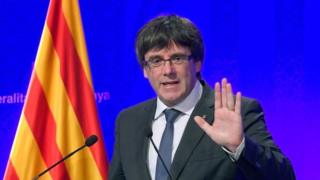
Catalonia’s ousted leader Carles Puigdemont agreed on Tuesday to a snap election called by Spain’s central government when it took control of the region to stop it breaking away, but he said the fight for independence would go on.
Spain’s High Court issued a summons for Puigdemont and 13 members of his sacked administration to testify in Madrid on Thursday and Friday as the court starts processing charges of rebellion, sedition and breach of trust against them.
Under Spain’s legal system, a judge will then decide whether Puigdemont should go to jail pending a comprehensive investigation and potential trial.
Puigdemont travelled to Brussels after the Catalan regional parliament issued a unilateral declaration of independence on Friday, and it was not immediately clear if he would heed the summons to appear before the Madrid court.
Belgium’s crisis centre said it was evaluating whether Puigdemont needed to be protected by Belgian authorities while he was staying in the country, Belga news agency reported.
He had said earlier on Tuesday he would return to Spain only when given unspecified “guarantees” by the Spanish government.
Puigdemont’s announcement that he would accept the regional election on Dec. 21 signalled the Madrid government had for now at least gained the upper hand in the protracted struggle over Catalonia, a wealthy northeastern region that already had enjoyed considerable autonomy.
Resistance to the central government’s imposition of direct control on Catalonia failed to materialise at the start of the week and the secessionist leadership is in disarray.
But a poll released on Tuesday showed that support for the creation of an independent state of Catalonia rose to an almost three-year high in October.
Spain’s Constitutional Court on Tuesday blocked the independence declaration – a largely symbolic move that gained no traction and led to the assembly’s dismissal by Prime Minister Mariano Rajoy less than an hour after it was made.
“I ask the Catalan people to prepare for a long road. Democracy will be the foundation of our victory,” Puigdemont told a news conference in Brussels, where he showed up after dropping out of sight over the weekend.
He also said he was not seeking asylum in Belgium.
Rajoy, who has taken an uncompromising stance throughout the crisis, is gambling on anti-independence parties taking power in the regional parliament and putting the brakes on the independence drive.
Puigdemont will hope a strong showing for the independence camp will reboot the secessionists after a tumultuous few weeks.
The Spanish government said at the weekend Puigdemont was welcome to stand in the election. The judicial process was a separate matter, it said.
The Supreme Court also began processing rebellion and sedition charges against Catalan parliament speaker Carme Forcadell and other senior leaders on Tuesday.
The political crisis, Spain’s gravest since the return of democracy in the late 1970s, was triggered by an independence referendum held in Catalonia on Oct. 1.
Though it was declared illegal by Spanish courts and less than half Catalonia’s eligible voters took part, the pro-secessionist regional government said the vote gave it a mandate for independence.
The United States, Britain, Germany and France have all backed Rajoy and rejected an independent Catalan state, although some have called for dialogue between the opposing sides.
Puigdemont, Vice President Oriol Junqueras and other Catalan leaders had said previously they would not accept their dismissal. But their respective parties, PdeCat and Esquerra Republicana de Catalunya, said on Monday they would take part in the election, a tacit acceptance of direct rule from Madrid.
The struggle has divided Catalonia itself and caused deep resentment across the rest of Spain, although separatist sentiment persists in the Basque Country and some other areas.
Two recent opinion polls showed support for independence may have started to wane.
But an official regional survey published on Tuesday showed some 48.7 percent of Catalans believe the region should be independent, up from 41.1 pct in June and the highest since December 2014.
Based on 1,338 interviews, the Centre d‘Estudis d‘Opinio poll was the first survey released since the independence declaration though the bulk of it was taken before then, between Oct. 16 and Oct. 29.
DIM HOPES
Despite his dash to the European Union’s power centre, Puigdemont’s hopes of engaging the bloc in his cause seem forlorn. Member states have asserted their support for Spanish unity and EU institutions in Brussels say they will deal only with Madrid and that the dispute remains an internal matter.
“Our position remains unchanged,” EU Commission spokeswoman Mina Andreeva said in Brussels on Tuesday.
But some analysts believe the dispute is not going to fade away anytime soon.

Leave a Reply
You must be logged in to post a comment.